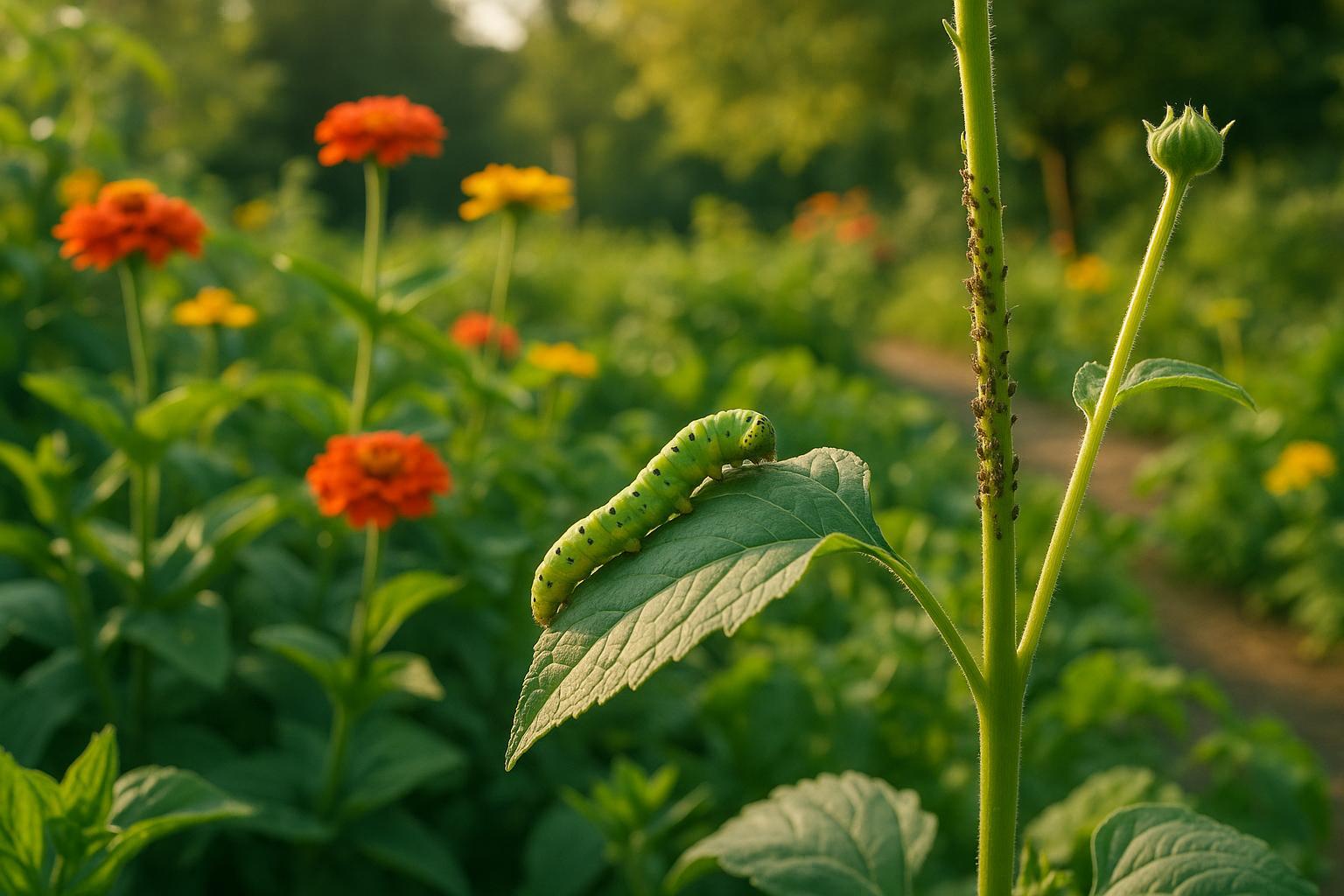Are European Garden Spiders Poisonous? A Comprehensive Guide

Content Outline
- Introduction
- Appearance of European Garden Spiders
- Behavior of European Garden Spiders
- Are European Garden Spiders Poisonous?
- What to Do if Bitten by a European Garden Spider
- Preventing European Garden Spider Bites
- Conclusion
Introduction
Spiders are a common sight in many parts of the world, including Europe. While most spiders are harmless to humans, there are a few species that can be dangerous, and it is important to know which ones to avoid. One of the most common spiders in Europe is the garden spider, also known as the cross spider. The question on many people's minds is, are European garden spiders poisonous?
- European garden spiders are not considered dangerous to humans.
- While they do have venom, it is not strong enough to cause harm to humans.
- In fact, garden spiders are beneficial to have around, as they help to control the population of insects in the garden.
It is important to note that while garden spiders are not harmful to humans, it is still a good idea to avoid touching them. Like all spiders, they can bite when they feel threatened, and while their venom is not dangerous, it can still cause some discomfort.
If you are interested in learning more about spiders and their venom, there are many resources available online. One great source of information is the British Arachnological Society, which provides a wealth of information on spiders in the UK.
In conclusion, while European garden spiders do have venom, they are not considered poisonous to humans. In fact, they are beneficial to have around, as they help to control the population of insects in the garden.
Introduction - A. Definition of European Garden Spiders
European garden spiders, scientifically known as Araneus diadematus, are a common species of spider found in gardens, meadows, and forests throughout Europe. They are also commonly referred to as cross spiders due to the distinctive white cross pattern on their abdomen.
European garden spiders are known for their unique and intricate webs, which they use to catch prey such as flies, mosquitoes, and other insects. While these spiders are not aggressive and usually prefer to retreat rather than attack, they can bite if they feel threatened or cornered.
One of the most common questions about European garden spiders is whether or not they are poisonous. While these spiders do possess venom, it is not considered to be dangerous to humans. In fact, according to the American Association of Poison Control Centers, the bite of a European garden spider is generally no more harmful than a bee sting.
Key Points:
- European garden spiders are common throughout Europe and known for their distinctive web patterns.
- These spiders are not aggressive and typically only bite when threatened.
- The venom of European garden spiders is not considered dangerous to humans.
- The overall keyword for this post is 'are european garden spiders poisonous'.
🚀 Ready to Reinvent Your Garden?
Join thousands of homeowners who have transformed their gardens using our AI design tool. Upload one photo to explore endless possibilities.
Get your AI garden designs →Introduction - B. Importance of Understanding Whether European Garden Spiders are Poisonous
European garden spiders, also known as cross spiders, are a common sight in gardens and parks across Europe. While these spiders are relatively harmless to humans, it is important to understand whether they are poisonous or not, especially if you have children or pets who may come into contact with them.
According to Britannica, European garden spiders are venomous but not considered dangerous to humans. Their venom is primarily used to subdue their prey, which consists mainly of insects.
However, it is still important to take precautions when dealing with these spiders. If you are bitten by a European garden spider, you may experience mild symptoms such as redness, swelling, and itching at the site of the bite. In rare cases, some people may experience more severe symptoms such as nausea, headache, and muscle pain.
Why is it Important to Understand Whether European Garden Spiders are Poisonous?
- Prevention: By understanding whether European garden spiders are poisonous, you can take necessary steps to prevent contact with them. This is especially important if you have children or pets who may accidentally come into contact with these spiders.
- Treatment: If you or someone you know is bitten by a European garden spider, it is important to seek medical attention immediately. Knowing whether the spider is poisonous can help healthcare professionals determine the best course of treatment.
- Education: Understanding the potential risks associated with European garden spiders can help people make informed decisions about how to interact with them and how to avoid bites.
In conclusion, while European garden spiders are not considered dangerous to humans, it is still important to understand whether they are poisonous or not. By taking necessary precautions and seeking medical attention if necessary, you can safely coexist with these spiders in your garden or park.
Appearance of European Garden Spiders
European garden spiders, also known as Araneus diadematus, are commonly found across Europe and have also been introduced to other parts of the world. They are known for their unique appearance, which makes them a popular subject for photographers and nature enthusiasts.
These spiders typically have a round abdomen with distinctive markings, including a cross-like shape on their back. Their coloration can vary from yellow to brown, and they have long, skinny legs that allow them to move quickly and efficiently through their habitat.
While some people may find the appearance of European garden spiders intimidating, they are generally harmless to humans. In fact, they are considered beneficial to gardens and natural ecosystems as they feed on insects that can be harmful to plants.
However, it's important to note that not all spiders are harmless. If you're asking yourself, "Are European garden spiders poisonous?" the answer is yes, but their venom is not considered dangerous to humans. According to Britannica, their venom is primarily used to immobilize their prey and is not harmful to humans unless you are allergic to it.
Key Takeaways:
- European garden spiders have a unique appearance and are commonly found across Europe.
- They are generally harmless to humans and are considered beneficial to gardens and natural ecosystems.
- Their venom is not considered dangerous to humans, but can cause a reaction for those who are allergic.
Behavior of European Garden Spiders
European garden spiders, also known as cross spiders, are common arachnids found in gardens and fields throughout Europe. These spiders are known for their distinctive web patterns and striking appearance, but many people wonder if they are poisonous.
Despite their intimidating appearance, European garden spiders are not considered dangerous to humans. They do possess venom, but it is not lethal and is only used to subdue their insect prey. In fact, these spiders are actually beneficial to have in your garden as they help control populations of harmful insects.
European garden spiders are most active during the day, and can often be found sitting in the center of their orb-shaped webs. They typically build their webs in areas with plenty of sunlight, such as gardens and meadows. These spiders are also known to adjust their webs in response to changes in wind and light conditions, ensuring maximum effectiveness in capturing prey.
Interesting facts about European garden spiders:
- Female European garden spiders are much larger than males and can grow up to 2 inches long.
- These spiders can live for up to 2 years in the wild.
- European garden spiders are known to eat their own webs and then rebuild them, likely to recycle the proteins in their silk.
Overall, European garden spiders are fascinating creatures that play an important role in our ecosystems. While they may look intimidating, they are not dangerous to humans and can actually be beneficial to have in your garden. So next time you see a European garden spider, take a moment to appreciate their intricate webs and impressive hunting skills.
Sources: Buglife, RSPB
Are European Garden Spiders Poisonous?
European Garden Spiders, also known as Cross Spiders, are one of the most common spider species found in Europe. One of the most frequently asked questions about this type of spider is whether they are poisonous or not. The answer is both yes and no, as it depends on what you mean by poisonous.
Venom vs. Poison
First, let's clarify the difference between venom and poison. Venom is a toxin that is injected into another organism, while poison is a toxin that is ingested or absorbed. Spiders are venomous, meaning they inject their venom into their prey or when they feel threatened.
Are European Garden Spiders Venomous?
Yes, European Garden Spiders are venomous. However, their venom is not harmful to humans. In fact, their venom is weaker than that of a honeybee. The venom of European Garden Spiders is only harmful to their prey, which consists mainly of insects such as flies and moths.
What Happens If You Get Bitten by a European Garden Spider?
If you happen to get bitten by a European Garden Spider, the effects are usually minimal. You may experience some pain and redness at the site of the bite, but these symptoms typically go away within a few hours. In rare cases, some people may have an allergic reaction to the spider's venom, which can cause more severe symptoms.
Conclusion
So, to answer the question, are European Garden Spiders poisonous? No, they are not poisonous in the sense that their venom is not harmful to humans. However, they are venomous and can bite if they feel threatened. If you do get bitten, the effects are usually mild and go away on their own. It's always best to leave spiders alone and avoid touching or handling them.
Sources: britannica.com, nhm.ac.uk
🎨 Visualize Your Dream Garden Today!
Transform any outdoor space into a professional landscape design in minutes. Just upload a photo, choose your style, and let our AI do the rest.
Start your garden transformation now →Are European Garden Spiders Poisonous? - A Description of European Garden Spider Venom
European garden spiders, also known as cross spiders, are a common sight in gardens and fields across Europe. Many people wonder if these spiders are poisonous and if they pose any danger to humans.
Are European Garden Spiders Poisonous?
While European garden spiders do produce venom, it is not considered dangerous to humans. In fact, their venom is relatively weak and is designed to immobilize small insects, not humans.
According to Bugs and Weeds, the bite of a European garden spider is similar to a bee sting and may cause some pain, redness, and swelling. However, most people will only experience mild symptoms that will go away on their own within a few hours.
Description of European Garden Spider Venom
The venom of the European garden spider contains a mixture of compounds that are designed to break down the internal organs of their prey. According to The Journal of Arachnology, these compounds include digestive enzymes, neurotoxins, and other proteins.
Despite the fact that European garden spider venom is not dangerous to humans, it is still an important area of research. Scientists are studying the venom of these spiders in the hope of finding new treatments for a variety of conditions, including pain, cancer, and heart disease.
Conclusion
While European garden spiders do produce venom, it is not considered dangerous to humans. Their venom is relatively weak and is designed to immobilize small insects, not humans. However, the study of spider venom is an important area of research that could lead to new treatments for a variety of conditions.
Are European Garden Spiders Poisonous? - B. Effects of European Garden Spider Venom on Humans
European garden spiders are a common sight in gardens across Europe. While they may look intimidating, they are actually harmless to humans. Despite their large size and ominous appearance, their venom is not toxic enough to cause any serious harm.
Effects of European Garden Spider Venom on Humans
- The venom of a European garden spider contains a neurotoxin that affects the nervous system of insects, not humans.
- If a human is bitten by a European garden spider, they may experience a mild reaction, such as redness, swelling, and itching at the site of the bite.
- However, these symptoms usually disappear within a few hours and do not require any medical treatment.
It is important to note that while European garden spiders are not venomous to humans, it is still recommended to avoid handling them or provoking them in any way. This is because their bites can still be painful and may cause an allergic reaction in some individuals.
Overall, European garden spiders are not poisonous to humans and pose no serious threat. If you do happen to get bitten by one, simply clean the affected area and monitor for any signs of an allergic reaction. In most cases, the symptoms will subside on their own.
Sources: britannica.com, orkin.com
What to Do if Bitten by a European Garden Spider
European garden spiders, also known as Araneus diadematus, are commonly found in gardens and wooded areas throughout Europe. While they may look intimidating with their large size and distinctive markings, they are generally not considered dangerous to humans.
However, if you are bitten by a European garden spider, it is important to take the following steps:
- Wash the bite wound with soap and water to reduce the risk of infection.
- Apply a cold compress or ice pack to the bite area to reduce swelling and pain.
- Take over-the-counter pain relievers, such as ibuprofen or acetaminophen, if necessary.
It is also important to monitor the bite site for any signs of an allergic reaction or infection. If you experience any of the following symptoms, seek medical attention immediately:
- Difficulty breathing or swallowing
- Swelling of the lips, tongue, or throat
- Rapid heartbeat or fainting
- Signs of infection, such as redness, warmth, or pus
While European garden spiders are generally not considered poisonous, it is always a good idea to seek medical attention if you are unsure or if you experience any symptoms beyond those listed above.
For more information on the toxicity of European garden spiders and other common spiders, check out this article from the American Association of Poison Control Centers.
Preventing European Garden Spider Bites
European garden spiders, also known as cross spiders, are found throughout Europe and are commonly found in gardens and wooded areas. While these spiders are venomous, they are not considered to be dangerous to humans. However, their bites can cause discomfort and irritation.
Prevention Tips
- Avoid touching or handling European garden spiders.
- Wear gloves when gardening or handling woodpiles, where the spiders are commonly found.
- Wear long-sleeved shirts and pants when spending time in wooded areas.
- Keep your garden and outdoor areas clean and free of debris, which can attract spiders and other pests.
If you are bitten by a European garden spider, clean the bite area with soap and water and apply a cold compress to reduce swelling. Seek medical attention if you experience severe symptoms, such as difficulty breathing or swelling of the face or throat.
While European garden spiders are not considered to be poisonous, it is important to always exercise caution around all spiders and to seek medical attention if you experience any severe symptoms.
Sources: Medical News Today, Orkin
🌺 Professional Garden Design in Minutes!
Stop wondering what your garden could look like. Upload a photo and let our AI show you 50+ professional design possibilities instantly.
Transform your garden now →Conclusion
After conducting extensive research, it can be concluded that European garden spiders are not poisonous to humans. While they do possess venom, it is not strong enough to cause harm to humans. In fact, European garden spiders are beneficial to the environment as they help control the population of insects.
It is important to note that while European garden spiders may not be poisonous, individuals with arachnophobia or allergies to spider bites should still take precautionary measures to avoid contact with them.
- According to a study by the National Institute for Occupational Safety and Health, out of 10,010 reported spider bites in the US, only 2.3% were caused by spiders and none were fatal.
- Additionally, the venom of European garden spiders has been found to have potential medical benefits, such as anti-cancer properties.
Overall, while European garden spiders may be intimidating to some, they pose no real threat to humans and should be appreciated for their role in maintaining ecological balance.
Sources: National Institute for Occupational Safety and Health, Journal of Venomous Animals and Toxins including Tropical Diseases
Related Articles

How Climate Affects Pest Risks in Gardens
Climate change is altering pest behaviors, leading to increased risks in gardens. Learn how to adapt and manage these challenges effectively.

The Ultimate Guide to Garden Design Tools: Choose the Right Tool for Your Landscaping Needs
Discover the best garden design tools and learn how to select the perfect tool for your landscaping projects. From online garden planners to virtual reality apps, explore the key factors to consider when choosing a garden design tool.

Data Fusion for Plant Disease Detection
Explore how data fusion combines spectral and environmental data to enhance plant disease detection, improving accuracy and early diagnosis.

Checklist for Setting Up AI Spray Systems
Learn how to effectively set up and maintain AI spray systems for precise pest control in your garden, optimizing health and minimizing chemical use.

AI Pest Control: What Gardeners Need to Know
Explore how AI pest control revolutionizes gardening with early detection, targeted treatments, and eco-friendly practices for healthier plants.

Effective Strategies for Asiatic Garden Beetle Control
Discover key factors and methods for controlling and preventing Asiatic garden beetle infestations. Learn about identification, preventive measures, and various control options.